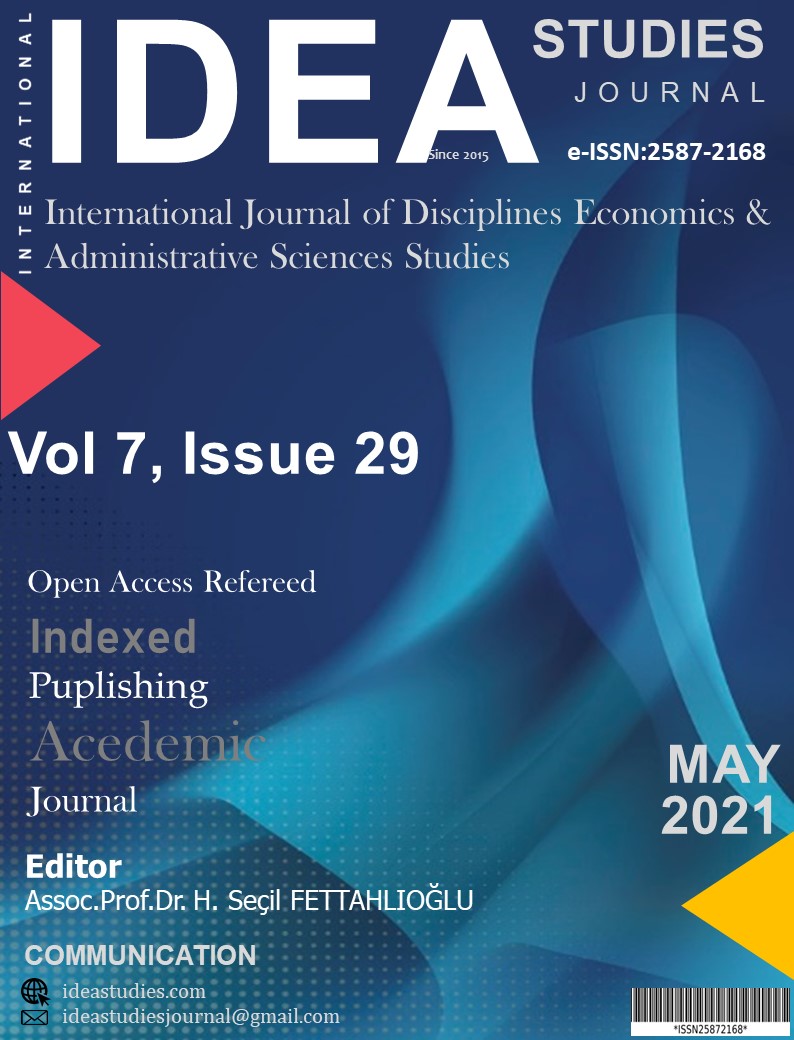Author :
Abstract
Giriş: Salgın zamanlarında etkili aşılar geliştirmek; özellikle söz konusu hastalığı tedavi edecek etkin terapötikler mevcut olmadığında çok değerli bir yaklaşımıdır. COVID-19 infeksiyonu 11 Mart 2020'de Dünya Sağlık Örgütü (DSÖ) tarafından pandemik bir hastalık olarak ilan edildi ve bir yılı aşkın süredir tüm dünya ülkelerinin bir numaralı sağlık sorunu olmaya devam etmektedir. Çeşitli antiviraller ve destek tedavileri kullanılıyor olsa da virüse direkt etkili bir tedavi protokolü geliştirilememiştir. Bu yüzden Covıd-19 pandemisinin önüne geçmek için tüm dünya sağlık otoriteleri bağışıklama gücü en etkin olan aşıyı üretme ve kullanma yarışına girmiştir. Amaç: Tire Devlet Hastanesinde, Covıd-19 inaktif aşısıyla aşılanan sağlık personelinin bağışıklık durumunu saptamak Gereç ve yöntem: Tire Devlet Hastanesinde çalışan 684 sağlık personelinin kan örnekleri düz tüpe alındı. Çalışmaya katılanlar; çift doz aşılanmış olan /hastalığı aktif olarak geçirip aşılanmayan/aşılama başladığı tarihte son 3 ay içinde PCR pozitif ve hastalığı geçirmiş olanlar/ kendi isteğiyle aşı olmayanlar olarak gruplandırıldı. Çalışmaya alınan bireylerin yaş, cinsiyet, ek hastalık kaydedildi. Ig G antikorları Siemens marka ADVIA Centaur XP model cihaz ve Siemens marka SARS-COV-2 Total(COV-2T) IG G kitiyle ELİSA yöntemiyle çalışıldı. Sonuçlar <1 index negatif , ?1-10 index pozitif olarak kabul edildi. Sonuç: 2 doz aşı yapılmış sağlık çalışanlarından alınan kanlarda sinovac inaktif virüs aşısının etkinliğini 28. gün antikor düzeyleri bakıldığında aşı yapılmayanlara göre ve hastalığı geçirenlere göre daha anlamlı yüksektir. Aşı olmayanlarda yaş ile antikor düzeyi arasında pozitif yönlü ve orta kuvvetli bir ilişki bulunurken aşı olanlarda yaş ile antikor düzeyi arasında negatif yönlü ve zayıf kuvvetli bir ilişki bulunmaktadır.
Keywords
Abstract
Introduction: Developing effective vaccines in times of epidemics; It is an invaluable approach, especially when effective therapeutics to treat the disease in question are not available. COVID-19 infection was declared a pandemic disease by WHO on March 11, 2020, and continues to be the number one health problem of all countries of the world for more than a year. Although various antivirals and supportive treatments are used, a treatment protocol that is directly effective against the virus has not been developed. Therefore, in order to prevent the Covid-19 pandemic, all world health authorities have entered the race to produce and use the vaccine with the most effective immunization power. Object: To determine the immune status of healthcare personnel vaccinated with Covid-19 inactivated vaccine at Tire State Hospital. Materials and methods: Blood samples of 684 healthcare personnel working at Tire State Hospital were taken into a flat tube. Participants in the study; were grouped as double dose vaccinated / actively not vaccinated / those who had PCR positive and had the disease within the last 3 months at the time of vaccination / were not vaccinated voluntarily. Age, gender and comorbidity of the individuals included in the study were recorded. Ig G antibodies were studied by ELISA method with Siemens brand ADVIA Centaur XP model device and Siemens brand SARS-COV-2 Total (COV-2T) IG G kit. Results were accepted as <1 index negative and ?1-10 index as positive. Conclusion: When the antibody levels of the sinovac inactive virus vaccine on the 28th day were examined in the blood taken from healthcare workers who received 2 doses of vaccine, it was significantly higher than those who were not vaccinated and those who had the disease. There is a positive and moderately strong relationship between age and antibody level in those who are not vaccinated, while there is a negative and weakly strong relationship between age and antibody level in those who are vaccinated.
Keywords
- 1. Sterlin D, Mathian A, Miyara M, Mohr A, Anna F.‘IgA dominates the early neutralizing antibody response to SARS-CoV-2’Science Translational Medicine 20 Jan 2021:Vol. 13, Issue 577, eabd2223 DOI: 10.1126/scitranslmed.abd2223
- 2. Vipin M. Vashishtha &Puneet Kumar Development of SARS-CoV-2 vaccines: challenges, risks, and the way forward Received 21 Jul 2020,https://doi.org/10.1080/21645515.2020.184552
- 3. Barney S. Graham ‘Hızlı COVID-19 aşısı geliştirme’ Ulusal Alerji ve Bulaşıcı Hastalıklar Enstitüsü, Ulusal Sağlık Enstitüleri, Bethesda, MD,Science 29 Mayıs 2020:Cilt. 368, Sayı 6494, s. 945-946DOI: 10.1126 / science.abb8923
- 4. Lindsey R Baden 1, Hana M El Sahly 1, Brandon Essink 1, Karen Kotloff 1, Sharon Frey 1, Rick Novak 1, David Diemert 1, Stephen Bir Spector 1, Nadine Rouphael 1, C Engl J Med. ‘mRNA-1273 SARSCoV-2 Aşısının Etkinliği ve Güvenliği’ 2021 Şubat 4; 384 (5): 403-416. doi: 10.1056 / NEJMoa2035389. Epub 2020 30 Aralık.
- 5. Xiangyu Chen, Ren Li, Zhiwei Pan, Chunfang Qian, Yang Yang, Renrong You ‘İnsan monoklonal antikorları, SARS-CoV-2 spike proteininin anjiyotensin dönüştürücü enzim 2 reseptörüne bağlanmasını bloke eder’ 17, sayfaları647 - 649 ( 2020 )
- 6. Y.Quan, L.Wei, S. Yingying, Antibody Responses to SARS-CoV-2 in Patients With Novel CoronavirusDisease 2019 Article in Clinical Infectious Diseases · March 2020DOI: 10.1093/cid/ciaa344
- 7. Chen, X, et al. ‘Human monoclonalantibodies block the binding of SARS-Cov-2 spike protein to angiotensin converting enzyme 2 receptör’ Cellular & Molecular Immunology. April 2020. https://doi.org/10.1038/s41423-020-0426-7
- 8. Q.-X. Long, B.-Z. Liu, H.-J. Deng, G.-C. Wu, K. Deng, Y.-K. Chen, P. Liao, J.-F. Qiu, Y. Lin, X.-, Antibody responses to SARS-CoV-2 in patients with COVID-19. Nat. Med. 26, 845–848 (2020).
- 9. Jee Young Chung 1, Melissa N Thone 1, Genç Jik Kwon ‘COVID-19 aşıları: Teslim bakış açılarının durumu ve bakış açıları’ 2021 Mart; 170: 1-25. doi: 10,1016 / j.addr.2020.12.011. Epub 2020 Aralık 24.
- 10. T.C.sağlık bakanlığı Covıd-19 aşısı bilgilendirme platformu (2020)
- 11. L. Guo, L. Ren, S. Yang, M. Xiao, D. Chang, F. Yang, C. S. Dela Cruz, Y. Wang, C. Wu, Y. Xiao, Profiling early humoral response to diagnose novel coronavirus disease COVID-Clin. Infect. Dis. 71, 778–785 (2020).PubMedGoogle Scholar
- 12. Gill Z.a, b; Nieuwoudt M.b; Ndifon W.a‘ The Hayflick Limit and Age-Related Adaptive Immune Deficiency’ Gerontology 2018;64.135-139 https://doi.org/10.1159/00047809





